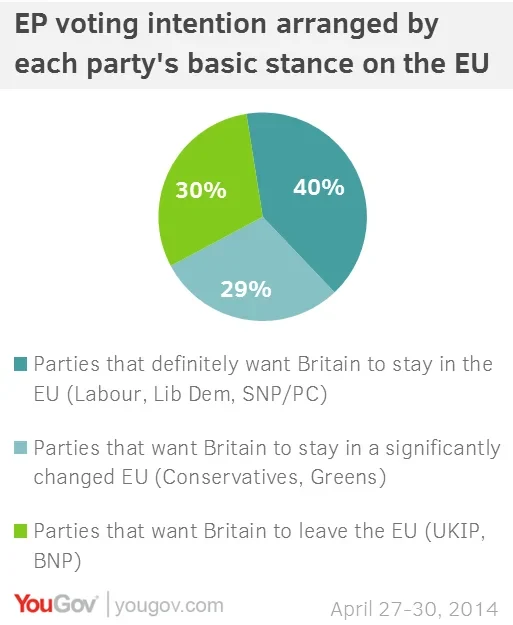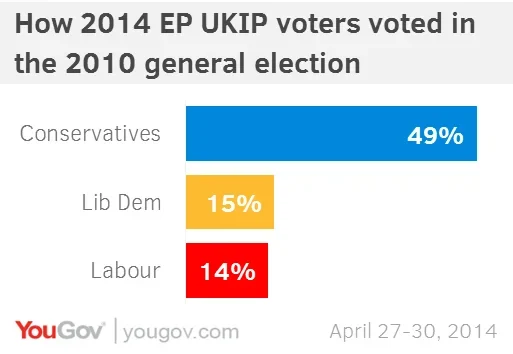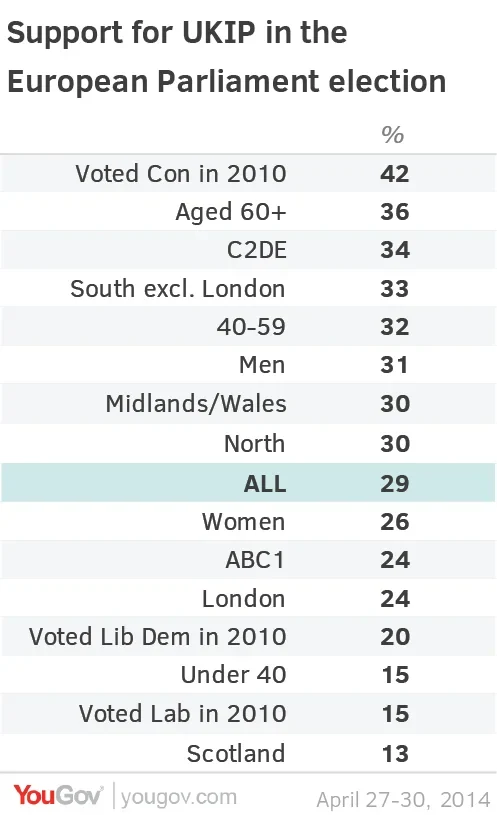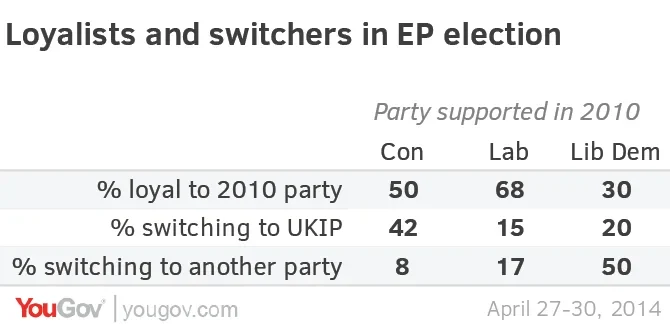YouGov President Peter Kellner takes a deep dive into YouGov's latest polling on UKIP and the upcoming European Parliament election
Hello and welcome to today’s big questions. When are (a) 29% a triumph, (b) 30% defeat and (c) 31% disaster?
The answers, of course, are (a) 2014, (b) 2010 and (c) 1997. 29% is UKIP’s current support in this month’s elections to the European Parliament. It is vying for first place, an outcome that Nigel Farage calls a political earthquake. 30% was Labour’s share of the vote when it was ejected from power four years ago; 31% spelt catastrophe for the Conservatives in 1997.
These comparisons are to some extent unfair to UKIP. The European elections are fought under a proportional voting system: measures of success and failure are different from the first-past-the-post system by which we elect House of Commons. And for a party with no MPs to have a real chance of coming first in a national contest is a remarkable achievement.
However, the comparison with past general elections helps to make the point that the public mood is not wholly captured by stories of “UKIP triumph”. Thus Nigel Farage has easily the highest rating of any Britain-wide party leader – yet most people think is party harbours racists; and UKIP’s recent surge has coincided with a rise, not fall, in support for Britain remaining in the European Union.
In the past ten days, YouGov has questioned more than 9,000 people about the coming elections, on behalf of the Sun, Sunday Times and Sun on Sunday. Taken, together they show UKIP (29%) neck-and-neck with Labour (28%), with the Conservatives on 21%, the Liberal Democrats 9%, Greens 8%, SNP/Plaid Cymru 3% and BNP 1%. Such a result would, indeed, be a triumph for Farage.

However, it would not justify the assertion that Britons reject the EU. We see this if we rearrange those figures into support for each party’s basic stance on the EU:
Parties that definitely want Britain to stay in the EU (Labour, Lib Dem, SNP/PC): 40%
Parties that want Britain to stay in a significantly changed EU (Conservatives, Greens): 29%
Parties that want Britain to leave the EU (UKIP, BNP): 30%
Those figures may be somewhat different in the election itself: if this month’s European Parliament elections follow the pattern of the last two, there could be a further surge in UKIP support. But for the moment it would be wrong to conclude that UKIP’s strong showing reflects an overwhelming desire to leave the EU. And it is perfectly possible for UKIP to come first and for a clear majority of Britons to criticise the party for attracting racists.

Separately, Farage should not claim that his party is winning votes from Labour on anything like the scale that it is taking them from the Conservatives. The 9,000 people we have questioned recently include almost 2,000 who intend voting UKIP. Almost half of them (49%) voted Conservative on 2010, while just 14% of them voted Labour and 15% Lib Dem.
How does this square with UKIP coming second in a series of by-elections in this Parliament in safe Labour seats in northern England? Simple: the party mainly mopped up the anti-Labour vote; Labour’s own share rose significantly in almost every contest. There is patchy evidence of UKIP eating into Labour’s support in some local council elections but – so far – nothing more than that.
Our large combined sample also allows us to gauge UKIP’s support among different groups. This is what we found:

Politically, of course, the most striking fact is that among those who voted Conservative in 2010 and intend voting this month, fully 42% plan to back UKIP. That is why the Tories look destined to come third in a Britain-wide election for the first time in their history.
Thus the pattern persists of UKIP appealing especially to men and to older and working class voters. And, as in 2009, UKIP is doing less well in London, and far less well in Scotland, than in the rest of Britain.
This is how the supporters in 2010 of all three main parties plan to vote this time (again, excluding don’t knows and won’t votes):

However, even Labour cannot crow too loudly that it enjoys the highest loyalty rate of the three main parties. 2010 was a terrible result. It was down to little more than its core vote. Yet of those who intend to vote this month, one in three plans to switch parties. Yes of course, this is a secondary, low-turnout contest fought under a different voting system. It is a chance to let off steam, not an occasion to decide who governs Britain. Even so, Labour must have hoped, and perhaps hopes still, to retain the loyalties of more of those people who wanted Gordon Brown to remain Prime Minister four years ago.
Those figures confirm that the Conservatives have by far the largest problem with UKIP – but the Lib Dems have the weakest loyalty figures of all. The difference is that former Lib Dem voters are heading all over the place – to Labour and the Greens in significant numbers and even (though rather fewer) to the Conservatives.
Image: Getty








